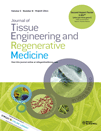The secretome of bone marrow mesenchymal stem cells-conditioned media varies with time and drives a distinct effect on mature neurons and glial cells (primary cultures)
Abstract
Transplantation of bone marrow mesenchymal stem cells (BM-MSCs) has been shown to ameliorate the injured central nervous system (CNS). Although these effects were initially attributed to the putative differentiation of MSCs towards the neural lineage, it is now known that most of them are mediated by the secretome. Up to now most in vitro reports have dealt with the effects of the secretome on neural stem cells and their differentiation. Consequently, there is a lack of information regarding the role of the secretome on the viability and survival of pre-existent matured differentiated cell populations. Moreover, it is also not known how the time points of conditioned media (CM) collection affect such parameters. In the present study, primary cultures of hippocampal neurons and glial cells were incubated with CM obtained from MSCs. To determine how the temporal profiles of CM collection impact on post-natal neurons and glial cells, we collected MSCs CM at 24, 48, 72 and 96 h of conditioning. MTS test revealed that for the hippocampal cultures the incubation with CM increased cell viability for all time points, with significant increases in the percentage of neurons in culture incubated with CM 24 h. For glial cells only the later time point of CM collection (96 h) increased cell viability. Fluorescence microscopy observations also revealed that CM 48 h and 72 h increased astrocytes percentages, while CM 24 h decreased microglial cell and oligodendrocytes values. These results revealed that post-natal neuronal and glial cells respond differently to MSCs CM; moreover, there are specific temporal variations in the composition of the CM of MSCs collected at different time points that trigger different effects on mature neurons and the distinct glial cell populations (astrocytes, oligodendrocytes and microglial cells). Copyright © 2011 John Wiley & Sons, Ltd.




